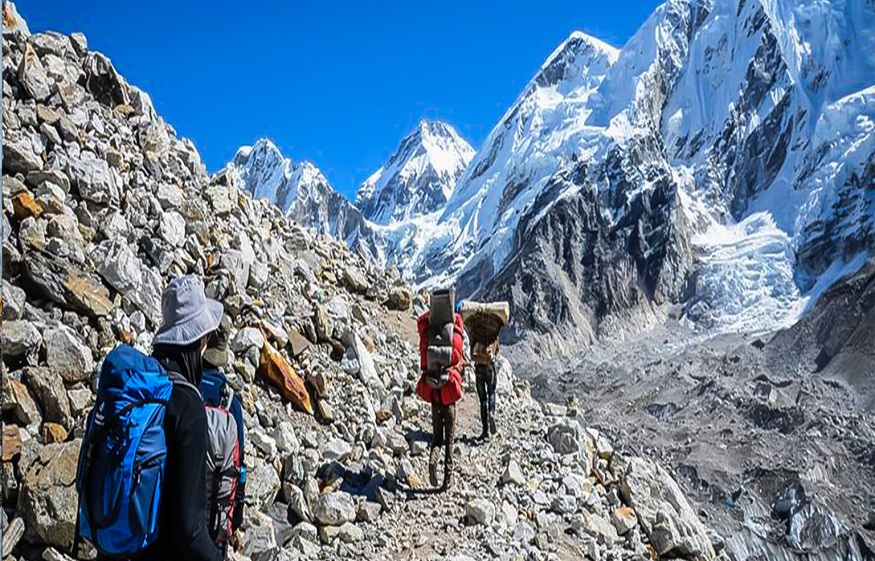Top Inspirational Quotes from the Everest Base Camp Trail

Words on the trail of Everest Base Camp (EBC) trekTop 7 Most Commonly Asked QuestionsCome and take a cold walk to the mountain. Early morning with sunlight hitting the peak of the mountain, trek to the Everest Base Camp (EBC), walking areas of prayer stones in the first Sherpa village, Namche Bazaar. Trekkers often find their motivation and inspiration from the beauty of the surroundings, the resilience and hospitality of the Sherpa people, and the unyielding spirituality of the region. Whether it is at the base of the tallest mountain in the world, Mount Everest, or in the shadow of one of the many ancient monasteries along the way, the trail provides opportunities for reflection that resonate long after you step back into the familiar streets of home.
Himalayan Base Camp Trek Sir Edmund Hillary, one of the first two mountaineers to summit Mount Everest, said one of the most famous quotes regarding the Everest journey. He is famously quoted as saying, “It’s not the mountain we conquer, but ourselves.” This simple but profound statement captures the essence of the trek. The experience of getting to Everest Base Camp is a physical one — that’s undeniable — but the gravity of what it takes to endure also sticks with your mind and spirit, making it an unforgettable journey. For many trekkers, it wasn’t about conquering a mountain; it was about finding inner strength and pushing past self-imposed limitations.
You’ll also find Sherpa wisdom as you navigate the villages and forests of the Khumbu region, like the saying, “The mountains are my home, and I walk the path with a heart full of gratitude.” Those mountains are more than just physical borders for the Sherpas; it is part of their lives, with a sacred nature. The Sherpas’ respect for nature, their steady determination, and their resilience in the face of harsh conditions are good lessons in humility and gratitude. We also find that trekking in the region is a great way to remind ourselves about what we have and to be grateful for the people and experiences that have shaped our lives.
Reinhold Messner, one of the most famous climbers in history, has another powerful quote from the EBC trail: “Mountains aren’t fair or unfair, they are just dangerous.” We will think about these words of Richard G. De Turris, as his trek through the unpredictable Himalayas unfolds, bringing with it altitude sickness, blustery winds, mudslides, wild dogs, and much more. You will need physical strength, mental resilience, and the ability to adapt to challenges along the way for the EBC trek. Nevertheless, it offers great satisfaction in overcoming those challenges, and every baby step is a victory on its own.
On the trail, you might also contemplate the Sherpa saying, “Slowly, slowly, we move forward.” This phrase captures the pace of the trek, teaching trekkers that big challenges can be conquered, as long as they’ve got their patience. You do it right, or you should not even do it. The EBC trail is lengthy and mighty; rushing through it will only take away the essence of the voyage. This slow pace and step-by-step approach can also be a great lesson in mindfulness and allow trekkers to connect more strongly with the moment.
Last but not least, “The journey is the destination” is a quote usually shared by trekkers who successfully completed the Everest Base camps. Sure, trek to EBC and take a picture, but the journey to the base camp is just as meaningful, if not more so, than the destination. Unless, of course, you genuinely need the results like a book signing, you cannot delay. Every single day is a discovery not just of the landscape, but of self, and the whole trek is rewarding on so many levels.
Regardless, these quotes do capture the spirit of the Everest Base Camp trek, whether they are from famous mountaineers or local Sherpas. They challenge adventurers to transcend their physical boundaries, reconnect with the environment, and contemplate the metamorphic potential of the trek. The EBC trail is about more than hiking; it’s a journey of self-discovery, and it transforms those who take it.
Words Matter on the Everest Trail: The Power of Speech
Well, on one hand, the EBC hike is a test of endurance against the harsh elements of nature, and it promises the toughest challenges you have ever faced. The mountains, the people, and the experiences along the trail speak to the soul in ways that words don’t often quite describe. However, there are plenty of sayings and quotes that capture the spirit of this amazing journey and give you energy and direction. There is immense power in words on the EBC trail. They remind trekkers why they keep moving, even when the road ahead is rocky or unclear. From timeless pearls of wisdom passed down by Sherpas to the rousing words of mountaineers who have summited Everest, these quotes are all about inspiration, perspective, and endurance. They resonate with the journeys of those who have traversed a similar path and give hikers the strength to continue, despite the challenges. Going to EBC is not only about arriving at a new place; it is about discovering you. Such is the case with the best quotes from the trail that express this deep reality and remind hikers to enjoy the adventure, channel strength from within, and keep moving one foot in front of the other. Such words resonate with trekkers when they take in the stunning vistas that the Himalayas have to offer, and when they are pushing through the physical and mental challenges of the trek. The Everest trail is full of words: companions, image-makers, tongue twisters, breath takers.
“The Journey is the Destination” — Enjoying the Trek
Everest Base Camp trek cost “The journey is the destination” is a quote of sum that sums up the Everest Base Camp trek the best. While the end goal may be Base Camp, there is a personal journey of experience and knowledge gained on the way. Trekking to Everest Base Camp is a humbling but incredibly rewarding experience. It takes trekkers through rugged terrain, over suspension bridges, to the heart of Sherpa villages and amid towering peaks. Every day on the trail presents its own difficulties, discoveries, and delights. The scenery, the fresh scent of the mountains, the experience with local people, it’s not really possible to put that into words. And perhaps most importantly, by engaging with the journey itself, trekkers come to learn the value of the moment, instead of fixating only on the destination. It’s a journey that tests you physically, but also mentally, forcing you to slow down and appreciate each step, each vista, each moment of connection with nature and fellow travelers. The saying “the journey is the destination” is realistic advice for trekkers — that the personal growth, the inner journey, the triumph are not just about arriving at Everest Base Camp, but the hurdles they cross, the challenges they reflect on, and the little achievements they celebrate in between. This new perspective not only adds to your average motivation but also opens up a whole new world of opportunities to accept rather than just thinking of the whole journey as a stepping stone to a place to check off the list.
“We don’t conquer the mountain, we conquer ourselves.”
“If you breathe the air in your lungs, you are living” is one of the most iconic quotes related to high-altitude climbing and the Everest Base Camp trek. “If you can dream it, you can do it!” — Sir Edmund Hillary. A quote like this really points out the inner journey that every single trekker is going to be on during their journey to Everest. But the real challenge comes with persevering forward, a test of mental and emotional fortitude, even more so than the strenuous task of putting one foot in front of the next as you work toward Base Camp. The Everest Base Camp trek tests trekkers to their limits, making them face exhaustion, altitude sickness, and a crisis of self-confidence. Yet each challenge also comes with the potential to uncover hidden reserves of strength, patience, and resilience. The hike is a mirror of the journey of life itself — Trek To Base Camp Mount Everest a chance to break through and conquer not only external barriers but internal ones. As they trek toward Everest, they ascend above doubt, fear, and discomfort. As they take it, they are getting mentally and emotionally stronger as they are able to silence the self-doubts and fears inside them that limit them. The journey to Everest Base Camp is a journey of self-discovery. While trekkers battle the physical aspects of the trek, they also learn to trust themselves, find their inner strength, and move past their limits. You know, it’s a reminder that sometimes the biggest victories are not when we overcome another person or obstacle, but when we overcome ourselves.
“Step by step: Importance of patience”
“When you break it down to one step at a time” is a mantra often uttered by trekkers on the Everest Base Camp trail, and it brings with it a profound lesson in patience and perseverance. The journey itself can be daunting, often involving long, steep ascents, thinning air, and the rigors of high-altitude hiking. But if pilgrims make a commitment to walk one step at a time, they put one foot in front of the other, one foot in front of the other, and somehow don’t lose themselves in an overwhelming goal. However big the mountain, it can be climbed one step at a time. The beauty of the Everest Base Camp trek is that it teaches trekkers the importance of slow, steady progress. Instead of camping on the forbidding endpoint, trekkers are told to focus on where they are now—every step toward it is an accomplishment in itself. The virtues of patience shine through, especially when trekkers face challenges like altitude sickness or physical fatigue. Instead of hurrying to complete the trek, they learn to hear their bodies, rest when they need to, and charge ahead when they’re ready. “One step at a time” serves not only as a strategy for making it through the trek but also as a life philosophy, as trekkers learn to be patient and remain present in the face of obstacles, trusting that each small effort will bring them closer to their goal.
“Push Your Boundaries” – The Only Limits in Life Are the Ones You Make
Pushing Through Boundaries. In action sports, we live by a simple quote: “The only limits in life are the ones you make.” It encapsulates the concept of overcoming boundaries of all kinds: physical, mental, emotional, etc. The trip to Everest Base Camp pushes trekkers to their limits and tests the physical limits of their bodies. The altitude, the physical effort, and the mental exhaustion are often perceived as formidable obstacles to overcome, but some trekkers quickly learn that these boundaries are often self-imposed. This quote is also a useful reminder, the body and mind are capable of so much more than we can ever imagine… We really do not know until we stretch beyond our comfort zone. The walk challenges physical strength with long days of hiking, steep climbs, and high altitudes. But mental barriers are sometimes the toughest to dismantle. Organizing trekkers is fear of failure, self-doubt, and the temptation to leave. But those with a push-your-limits mentality often realise they can achieve more than they ever thought. Erik says that getting to Everest Base Camp is not about the summit, but pushing through limits you have set on yourself, physically and mentally. Traveling with this approach, conquering the altitude, enduring the long days, pushing past self-doubt, trekkers who follow this mindset come home changed, their personal growth extending far beyond the trek itself. The realization that restrictions are only temporary and the mind is the architect of reality, unlocks some deep level of strength within as trekkers challenge themselves.
Success Is the Sum of Small Efforts, Repeated Day In and Day Out – Perseverance on the Trail
Everest Base Camp Trek That reminded me about the Everest Base Camp trek where we were constantly, one step at a time, going towards the “Success is the sum of tiny efforts, repeated day in and day out. The trek to EBC is not one massive, daunting leap, but a series of tiny, incremental movements, slowly but surely advancing hikers to their destination. It can be easy to get discouraged when looking at the enormous length of the trek ahead, but this quote serves to remind trekkers that success is only achieved actually putting in the hours, no matter how small the progress may feel in the present moment. The hike to Everest Base Camp is long, challenging, and often requires trekkers to rise early, walk for hours, and overcome obstacles such as altitude sickness, exhaustion, and variations in the forecast. But it is through each of these small efforts — putting one foot in front of the other, fighting through moments of doubt — that trekkers ultimately arrive at their final destination. The challenge to complete the EBC trail isn’t only physical; it is mental fortitude, patience, and perseverance. This quote highlights the persistence involved in doing something that truly matters, showing trekkers that when accompanied by daily effort, most of the hardest goals can be achieved. The Everest Base Camp trek becomes a microcosm of life itself: achievement isn’t about monumental feats, it’s about the compound effect of tiny, concentrated efforts executed steadily over time. With tenacity, trekkers discover that their aspirations are attainable.
“At The Darkest Hour Lies The Brightest Opportunity” — Overcoming Obstacles
Everest Base Camp Treks. The famous quote “In the middle of difficulty lies opportunity” reminds us that problems disguised as problems are potentially the greatest opportunity for learning. There’s never an easy day on the Everest Base Camp trek—trekkers are met with difficult weather, steep climbs, and the rigors of high-altitude hiking. Yet it is surmounting these challenges that trekkers find not just the grandeur of the Himalayas, but their own inner strength and resilience. The struggle of making it to the top tends to prepare us to go even further. The effort required to push on can become daunting, but in doing so, we unlock a power we’ve never recognized. Every challenging moment there is also a chance: a chance to learn patience, a chance to connect with others, and a chance to notice your own ability to endure. Amid the grind, trekkers often find personal revelations, whether it’s summiting an incline or pushing through dips of fatigue, harnessing mental endurance. Join one of the greatest minds in entrepreneurship today as he turns his own adversities into triumphs through the right mindset, which changes obstacles into opportunities and makes the journey worthwhile! The lesson is that the real reward is what we learned and how strong we’ve become as we pushed through to get to the Everest Base Camp.
“What Lies Behind Us and What Lies Before Us Are Tiny Matters Compared to What Lies Within Us” — Self-Discovery
“What is behind us and what is before us are small matters compared to what lies within us.” This saying by Ralph Waldo Emerson perfectly describes the essence of Everest Base Camp, where the trek is not only about superior fitness; it is, more importantly, a test of your internal landscape. The Everest Base Camp trek can be an arduous journey that pushes trekkers to their limits of both physical and mental endurance as they gain elevation, face unpredictable weather, and combat exhaustion. It is during these challenging times that trekkers often find the extremes of their tenacity, forbearance, and grit—traits that might have been buried before the journey began. What isn’t a challenge or a test of the future is a past experience, as in the unveiling of an inner strength that shapes the journey. The mountains, the landscape, and the Sherpa communities mirror the trekker’s sentiment of an inward journey towards self. Embracing your inner strength is vital in overcoming the external challenges of the journey, so many trekkers turn to their inner resolve and ability to adapt, recognizing that what they can draw out from within is far more powerful than the obstacles laid in front of them. This takes the Everest Base Camp trek and makes it not just a physical destination but also an inner journey, discovering reserves of courage and strength that trekkers didn’t even know they had.
“Mountains Are the Earth’s Sentinels” — Nature’s Wisdom
Mount Everest base camp Trek The mountains with their majesty, grandeur, and timeless wisdom are often referred to as the Earth’s sentinels, an insignia for protecting itself from harm. The Everest Base Camp trek offers trekkers the opportunity to stand before the Himalayas, some of the most massive and daunting mountains on the planet. These colossal mountains are not only geological marvels; they represent nature’s everlasting strength and squanders. The trek to Everest Base Camp exposes trekkers to a mind-blowing, humbling environment. The mountains loom, the keepers of secrets, keeping their silence over the land and lives within it. The sweeping views of Mount Everest, Lhotse, Makalu, and Nuptse serve as a reminder of the incredible power and eternal nature of the world. The quote also captures the spiritual aspect of mountains in Sherpa culture, where mountains are sacred and considered the abode of the gods. They say you can go nowhere closer to trek the Himalayas where trekking through these high-altitude landscapes gives the trekkers not only the physical challenges but also an opportunity to reconnect with nature and reflect on the ancient wisdom. Millennia, of living, of seasons, and the passage of time. In their quiet power, they provide lessons in perseverance, strength, and humility. The respectful presence of mountains reminds trekkers that it is nature that creates and controls everything in human life.
“You Will Never Know Your Limits Until You Push Yourself to Them” – Personal Development
“Until you push yourself to your limits, you will never know your limits” is a saying that should hit home for anyone embarking on the arduous trek to Everest Base Camp. The hike is a challenge in both body and mind, regularly forcing trekkers to wrestle with their limitations, whether that be fighting altitude illness, completing long days of walking, or simply expanding beyond their tiredness. And when trekkers uncover their unexpected limits as they climb higher to higher altitudes and trudge through challenging lands. But it is by overcoming these limits that trekkers grow as individuals. Every challenge encountered and conquered on the hike turns into a moment of discovery where trekkers understand that they are capable of so much more than they thought possible. Whether that means mustering the energy to press on after a particularly challenging day or dispelling doubts about whether they can complete the trek, the trek to Everest Base Camp is one of overcoming discomfort and uncertainty. Trekkers discover that their endurance, adaptability, and resilience on the trail are far more than they ever thought possible. Trekkers find a greater sense of triumph not only by overcoming challenges and discomfort but in discovering new depths of strength and resilience. The trek is a reminder that the limits we impose on ourselves are often the very things that keep us from growing.
“Adventure is Around Each Corner” – Welcoming the Surprise
“Adventure waits on every corner” is a perfect description for the Everest Base Camp trek. Although the hard work is what everyone expects from the trail, there are countless moments, at times surprising and often startling, that make the journey unforgettable. New vistas, new encounters with Sherpa culture, or quirky natural features await around every bend in the trail. Whether it’s the sight of a snow-capped peak glistening in early morning light, a monastery tucked into the cliffs, or an encounter with local wildlife, adventure is part of the fabric of the trek. The beauty, richness of the journey are the unforeseen elements of it. Everest Base Camp is not just a goal, but also a series of unexpected experiences awaiting trekkers at every turn. “Pioneering adventure could sometimes be something unexpected, like a change in weather or a trail that needed to be altered, but trekkers take it in their stride. Sometimes it’s tucked into the exchanges with the people you meet on the path, whose anecdotes and insight foster deeper meaning in your journey. The secret to having a good hike is to roll with the punches. So, the EBC trek adventure is more about the journeys every day, the surprises and challenges that come one day at a time on the way to a destination that most will never reach.
Conclusion: Bringing the Trail Inspiration Back to Daily Life
The Everest Base Camp is more than a physical challenge to reach the base of the world’s highest peak. A pilgrimage that leads down a path of personal growth, self-discovery, and spiritual reflection that lingers long after the last day of hiking is completed. Trekkers come back taking with them the strong quotes they encountered along the way and the lessons, such as embracing the process, finding inner strength, stretching beyond themselves, which become part of their DNA and transform their lives in meaningful ways. The trek teaches trekkers that each step of the journey is a step toward growth, that patience and perseverance are what conquer obstacles, and that the journey itself is as important as the destination. These lessons continue into real life. Lessons from Trail Life: Whether navigating personal challenges, pursuing goals, or improvising amid the unexpected, the trail teaches wisdom that can inspire trekkers to engage in a renewed sense of resilience, determination, and appreciation for the present moment in life. Everest Base Camp trek, in all its struggles and successes, is a metaphor for how we sit with the challenges life throws our way. These lessons can inspire trekkers to keep pushing themselves, stepping into the unknown, and finding adventures in the day-to-day. After all, the Everest Base Camp trek is not merely a physical feat; it’s an invitation to navigate through life with bravery, curiosity, and profound reverence for the pilgrimage itself.
If you’re looking for more information or help customizing your trek, get in touch via [email protected] or WhatsApp +977 9866007038.







